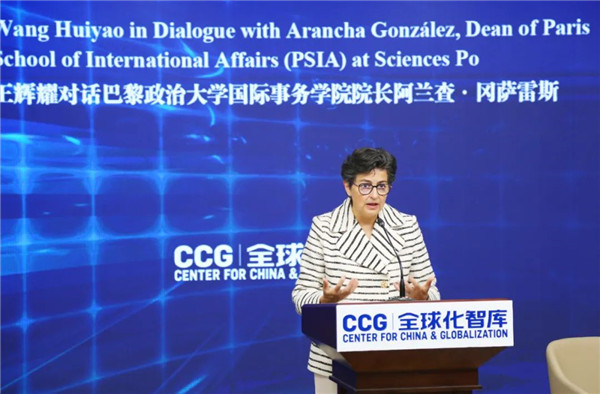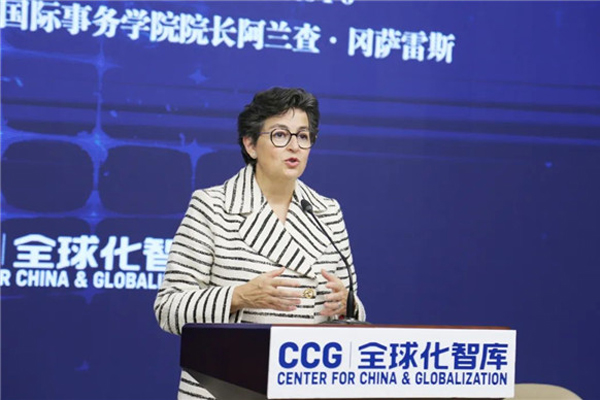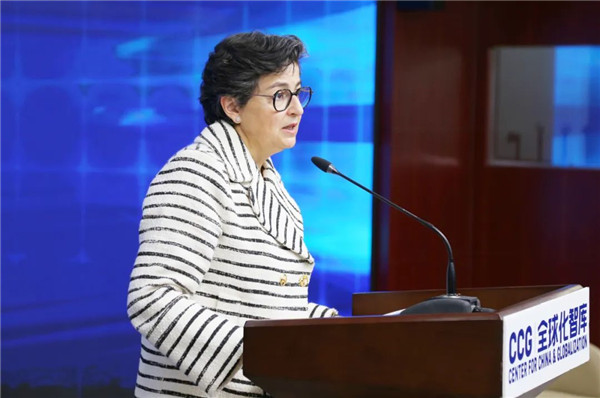Arancha González delivers a speech at CCG
November 14 , 2023In the current global landscape, which is marked by complexity and dynamism, the evolving international trade ecosystem raises vital concerns regarding trade resilience, equitable distribution, inclusive growth, and environmental impact.
On November 3rd, Arancha González, delivered a speech at the Center for China and Globalization (CCG). She introduced her new book and engage in a dialogue and discussion on global trade-related topics with Dr. Henry Huiyao Wang, President of CCG.

The following is the full text of the speech:
Thank you for this great invitation to be part of the CCG family. It’s my 1st visit to China as the Dean of the Paris School of International Affairs at Sciences Po. It’s obviously not my 1st visit to China. But I certainly am very happy to be here.
At a time when the world is going through a lot of turbulence. We are seeing the impact, devastating impact of climate change. We are seeing the multiplication of conflicts in many parts of the world, including the returnal of war in particular, but not only in the European continent, a war that we thought was behind us. We have seen a pandemic that has devastated not only our health and led to lots of suffering in everywhere around the world, but also has a huge, a tremendous impact on our economies. We are seeing rising geopolitical tensions. We are seeing gaps related to income, growing income inequalities in many parts of the world. This is a world that is in a lot of flags, in a turbulence, and obviously, in this world that is in search of a new world order, international trade is one of the fault lines of this new world in the making. This is why, I was very tempted to put a few thoughts on a handbook that I have recently published. It’s called Making Trade Work for Prosperity, for people and for Planet. And the message in this book is a very simple one. Trade, which has been an incredible vehicle for prosperity, for lifting billions out of poverty, for generating growth, for helping with innovation, competitiveness, can continue to be this incredible too. But we now need to make sure that we harness international trade. We harness to make sure that it responds to the concerns that many have on the climate change front, that we make it work towards planet, that we harness international trade to make it also work for all, and not just a few.
Now, this is a bit the, let’s say, the challenge we have ahead of us. As I said, trade has been an incredibly effective tool for prosperity and for global development but also we have seen how international trade has now become a source of weakening others. We have seen the weaponization of international trade. so we have seen how much it has helped others, but we have also seen that others have lost in this process. We have seen, these many faces that international trade has.
So the question is, trade, like globalization, has all these many faces for good and for less good. How can we harness all these forces? And this is a bit the task that we have ahead of us. And I like to a sum it up in three steps. It’s almost like if we had to do a dance with three steps, not just with one step. In the past, it used to be just open markets, and the rest will follow. Today, we have to be a little bit more sophisticated. Step number one is obviously, to make trade possible. And we make trade possible when we open markets through unilateral trade policies, but more often through bilateral agreements or through multilateral negotiations. That’s what makes trade possible, when we agree to reduce, collectively or bilaterally, originally, the obstacles to international trade. Traditionally, we have done this in the World Trade Organization, multilaterally, and it is true that today, multilateralism in the area of trade, like multilateralism across the board, is suffering a lot of headwinds. We are hearing many declare the WTO too unefficient, not good enough, not modernized enough. And I think our collective task is to make sure that we have today a WTO that is fit for purpose. And fit for purpose in the WTO means that the members of the organization make trade possible, which is what the WTO does. By focusing on a few areas that today are at the forefront of the disagreements between the members. How can we make sure that the rules of international trade and our aspiration to protect climate change are compatible? Climate Change is our existential threat, so we need to deal with climate change. We’ve agreed to do this. In the Paris Climate Agreement, we have agreed, every member of the international community has agreed to take national measures to reduce emissions and to help us keep the temperature of the Earth below an increase that is no more than 1.5 degrees centigrades. But these national measures we are seeing today can have big spillover effect on others. So we need to find the spaces, I think the WTO is a good place to do that, where we ensure some sort of compatibility between the measures that different countries take to protect against climate change, so that we don’t do this through beggar-thy-neighbor policies, but we do this in a manner that will help all members of the international community fight against climate change, and do this while preserving our possibility to maintain more sustainable growth, including through trade. WTO is also confronting the need to discipline a little bit better industrial subsidies, subsidies in general, and industrial subsidies in particular. It’s clear that to achieve this climate transition, to achieve the digital transition that many countries are embarked on, incredible amounts of public financing are being used, and how we use this public financing will matter a lot to whether or not this transition works for every country or not just for a few countries. and this is why the WTO needs to look a little bit more attentively at disciplines around industrial subsidies, so that it helps all countries achieve these massive transitions that that we have ahead of us.
WTO is also at the moment confronting a dispute settlement that has lost a little bit of shine compared to the system as it was set up in 1995. The WTO dispute settlement is not just a very unique dispute settlement. it is a very effective one in making sure that businesses, whether they are big, and more importantly, whether they are medium or small; countries, whether they are big, and more importantly, whether they are medium or small, can fight with the law, I suppose, than with pure force. And this is why it’s important that WTO members also look at the reform of the WTO dispute settlement, so that it can help members in finding a way to deal with their trade differences and prevent those trade differences from escalating into trade wars, which is, as we know, detrimental to everyone in the international community.
Now, WTO members also need to look at how they will consider national security. Every country wants security for itself, and it’s understandable that every country wants to have the ability to protect its own security, but however a country does that matters to the others too. That’s why in WTO, there was an exception to the WTO rules to be invoked in the cases where national security with a capital “N” and capital “S” was at stake. The impression I have looking at the situation today is that this exception is being interpreted in such a wide way that may end up being the rule and emptying a lot of the forces the WTO rules have in ensuring a level playing field for all its members. So WTO members need to have a bit of a look at how to deal with national security.
Some would say this is a very tall order. I would say that, judging from the last ministerial conference that took place at the WTO last year, where a big deal was achieved to cut subsidies that contribute to overfishing, showed that when there is a will, um, there is a way for members of the WTO to get to a result. That’s what they demonstrated last year, where China, the US, Ukraine, Russia, the European Union, every member of the WTO agreed to this deal to cut subsidies that contribute to the degradation of our biodiversity. So I think it’s possible, but we need to create the spaces where this possibility translates into action to modernize the rules of international trade.
But here we are still in the step one of this dance in international trade, which is about making trade possible. We still need to make trade happen. And this is not only about trade agreements. It also has to do with the investments that are necessary in the trade infrastructure, in the customs infrastructure, in digitalizing those customs and making them more speedy. On trade finance, which is the part of finance that is the lifeblood for international trade. So in addition to making trade possible through trade agreements, through negotiating in the World Trade Organization, there is still a 2nd step to be undertaken to help businesses of all sizes, big or small, medium, micro, men entrepreneurs, women entrepreneurs, join international trade. And it’s important that they can do it because we know that at the end of the day, participating in international trade is the more lucrative part. It is more lucrative than just being confined to very, often, very small, domestic markets. So step two for governments, for the private sector, is to ensure that they make trade happen.
But this is not enough. There is a 3rd step, and this is a very important 3rd step that, in my view, we have underestimated over the years, and this has to do with making trade work for all. We know that opening markets generates “winners,” but we also know that open markets, advances in technology, advances in digitalization, advances like we are seeing now in artificial intelligence, in robotics, also mean that others will “lose.” Now, how we manage the transitions matters a lot for the legitimacy of policies to keep markets open. So what we have seen is that in countries where measures have been taken in the form of a strong social safety net to help this transition, legitimacy for open markets has been great. And in countries where social safety nets are not robust enough, there is a lot of resistance to keep markets open. So the 3rd and most important step, it’s a step that’s not in the hands of trade ministers, it’s not in the hands of trade negotiators, it’s not in the hands of very often, businesses. It’s in the hands of a whole-of-government approach to strengthen social settlements, to improve education, to improve health care coverage, to ensure there is a possibility for those who lose their jobs to be retrained and rejoin the labor market, taxation policies that are fair. This is also what we need to get right.
So, I think we are, at the moment, seeing a lot of pushback on open markets and international trade. I think we need to listen to this pushback, but more importantly, we need to ensure that we respond to it. In my view, judging from history, the response will not come from closing our markets, adopting protectionist policies, or beggar-thy-neighbor policies. The response will come from our collective ability to establish new rules that facilitate trade, invest in ensuring that these rules benefit all aspects of our economy, and, most importantly, from our collective ability to provide necessary social safety nets both domestically and internationally.
So, this is the actual challenge that confronts all of us today, especially at a time when it is true that geopolitical rivalry is on the rise. As I like to say, the laws of geopolitics may have changed, but the laws of economics have not. If we want the laws of economics to remain effective, we need to collectively find a way to manage geopolitical turbulence. This message aligns well with an audience like CCG, an organization that has long worked towards achieving a more balanced, equitable, and sustainable globalization, which is indeed what lies ahead of us.
Thank you very much for this opportunity to be with you today, and I am very much looking forward to the dialogue that will follow.
Note: The above text is the output of transcribing from an audio recording. It is posted as a reference for the discussion.
CCG in Dialogue with Arancha González
Topical News See more









